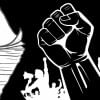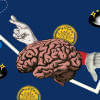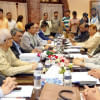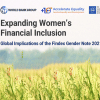The future of Bangladesh depends on trust

In Bangladesh, we often talk about roads, bridges, export zones, and shiny digital systems. These are the signs we look to when we speak of progress. But there's one kind of infrastructure that we've quietly left behind. We don't debate it on talk shows. We don't measure it in megawatts or kilometres. Yet without it, everything else struggles to stand. That missing piece is social trust.
Right now, Bangladesh is rising in numbers. Our GDP is growing. Our global partnerships are expanding. Our cities are full of cranes and construction. And yet, for all this growth, we seem to be shrinking in another way. People do not seem to trust one another. They don't trust institutions. They don't trust the process. We are moving forward on paper, but drifting apart in spirit.
Political scientist Francis Fukuyama once called social trust the glue that holds society together. He meant the basic belief that others will act fairly, that institutions will serve everyone, and that public life is not a game rigged in advance. In countries where this kind of trust exists, people pay their taxes more willingly. Governments spend more effectively. Citizens work together more easily. Trust, it turns out, is not just a moral value. It is a foundation for prosperity.
Here in Bangladesh, that foundation is weakening. The December 2024 pulse survey by BRAC Institute of Governance and Development (BIGD) indicates this deterioration of trust. It's a warning sign. When people believe that success depends on connections rather than competence, it becomes hard to dream and hard to believe that rules matter at all.
When people feel cheated, they often start to cheat, not out of malice, but to survive. You hear it all the time. "Everyone's doing it. Why shouldn't I?" In this way, mistrust becomes contagious. One small betrayal leads to another. Before long, a quiet cynicism seeps into everyday life.
This isn't just a Bangladeshi problem. Many countries have gone through similar phases. South Korea, for example, faced a major trust crisis in the 1970s. Their response wasn't limited to economic planning. They made public budgeting more transparent so people could see where every won, the South Korean currency, was going. They introduced tools so that citizens can directly provide the government with feedback. And they reimagined education, emphasising ethical citizenship, not just grades and ranks. Bit by bit, that changed how people felt about the system. It became more open, more accountable, more human.
Malaysia also went through a period of deep division after the ethnic riots of 1969. In response, they introduced "Rukun Negara," a five-point national philosophy focused on unity and justice. These weren't empty slogans. They were taught in schools, repeated in civil service training, and reflected in how the government communicated. Later, they even set up citizen feedback mechanisms within their policy labs, making people feel part of the process rather than subjects of it.
There's a lot Bangladesh can learn from these examples because trust is not something that appears on its own. It has to be designed and consistently practised.
And right now, we need it more than ever. Bangladesh is stepping into a more complex world, trying to balance relationships with China, India, and the West. At the same time, we're rolling out digital systems like e-filing, online land records, and AI-based services. None of these will succeed if people don't trust them.
An investor won't stay in a market where the rules change without warning. Young people won't believe in democracy if it feels like a show where the outcome is the same as before.
Part of our problem is that we often try to build consensus without first rebuilding trust. That's why reform commissions and national dialogues so often fall flat. When people come to the table already suspicious of one another's motives, no agreement lasts long. Consensus cannot be forced. It has to be rooted in good faith.
So, what can we do? For starters, we need to make transparency a right, not a favour. Every ministry should publish its spending, projects, and results so that people can understand them. Digital dashboards. Open tenders. Public feedback. In some places, technologies like blockchain can help track things like land transactions or local budgets in a way that's tamper-proof and clear.
We also need to rethink education. Our students need more than math and memorisation. They need to learn how to think critically, how to listen, and how to disagree without attacking. Subjects like design thinking, media literacy, civic responsibility, ethics, and even patriotism should be woven into the curriculum. Our schools and universities should be the spaces where young people learn to trust each other and build together.
We also cannot avoid the issue of inequality. When people feel left behind, they also stop believing in the system. Reducing inequality is not just about fairness. It's about social stability. It's about giving everyone a reason to invest in the country's future.
Media, too, plays a role. We need journalism that informs rather than inflames and holds power accountable without becoming a tool of power. Independent media councils and fact-checking bodies can help restore faith in what we read and hear.
And perhaps most importantly, our politics must lead by example. We need moments where leaders from different sides come together, for education, for climate, and national wellbeing, not just for show, but as a genuine signal that disagreement doesn't have to mean disunity.
According to an article published on the World Bank Blogs, trust in institutions is one of the strongest predictors of a country's ability to grow and transform. Nobel laureate Elinor Ostrom found that even the most fragile communities can thrive when trust is present and respected.
Imagine a Bangladesh where a student believes that the public exam was fair, where a small business owner knows that policy won't change overnight. That is not a dream. That is a plan.
We don't need more slogans. We need more trust.
Ashfaq Zaman is the founder of Dhaka Forum and a strategic international affairs expert.
Views expressed in this article are the author's own.
Follow The Daily Star Opinion on Facebook for the latest opinions, commentaries and analyses by experts and professionals. To contribute your article or letter to The Daily Star Opinion, see our guidelines for submission.

 For all latest news, follow The Daily Star's Google News channel.
For all latest news, follow The Daily Star's Google News channel. 










Comments